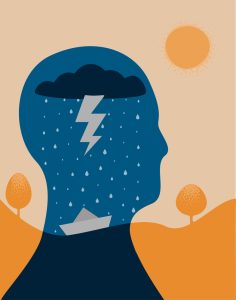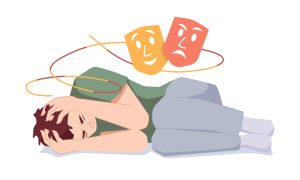When someone is physically ill, they consult with a physician. When someone is wounded they go to the emergency room and receive the necessary care and bandages. Yet, for whatever reason, when someone is mentally ill or mentally wounded, individuals ignore it, or seek no professional care for these types of wounds or illnesses. Individuals may consider wounds to the mind and soul as inferior, or since they cannot be seen, not worthy of medical attention. Others may be embarrassed or see mental wounds as the wounds of weak people. Culture has created the image of the tough minded person who never sheds a tear or allows anything to bother and has glorified this type of person as attractive and admirable. In addition, culture looks at mental sickness and associates it with crazy. The stigma of crazy and psychotic associated with mental wounds wards off individuals from seeking help for fear of ridicule in social, professional and family settings.

All of these issues and stigmas leave mental health as something is neglected and forgotten for many. Yet, while invisible, mental health is a serious issue for millions of Americans. With rising shootings, mental breakdowns, and uncivil rest, mental illness is a serious issue in America. Millions suffer from depression, anxiety, or other unresolved traumas that haunt them. Instead of seeking the professional guidance they need, they instead hide, neglect, ignore, or push through the mental situation.
False imagery of strength, stigma associated with mental illness and neglect of mental health as opposed to physical health all play three key components for mental health neglect. It is hence important to recognize mental health as a pivotal part of human health and to recognize emotional wounds as deep and painful as physical wounds. Stigmas about mental health tying it together with psychotic or crazy need to be removed and individuals need to find the counseling and medication they need to find healing and peace with the mental issues they may face on a day to day basis.
The article, “Mental health: Overcoming the stigma of mental illness” from the Mayo Clinic Staff takes a closer look at stigma and the problems it can cause with mental health. The stigma is not only an external issue found in society but also a self imagery stigma that many possess itself. The article states,
“Stigma is when someone views you in a negative way because you have a distinguishing characteristic or personal trait that’s thought to be, or actually is, a disadvantage (a negative stereotype). Unfortunately, negative attitudes and beliefs toward people who have a mental health condition are common.”
“Mental health: Overcoming the stigma of mental illness”. Mayo Clinic Staff. Mayo Clinic. May 24th, 2017. Mayo Clinic
To access the full article, please click here
Overcoming Stigma in Mental Health
Overcoming stigma with mental health starts first with oneself. It involves dismissing past archetypes of what a strong person is or is not. For example, the old image that men should not cry is an older image that associated all males must be strong and never show weakness or tears. This type of image can cause intense emotional damage to a man who is experiencing the mental wounds of depression. Individuals who experience issues with depression, anxiety, OCD, ADHD, unresolved trauma, or PTSD need to understand that what they feel is natural and involves an invisible wound that is no less real than a physical wound. Seeking help does not make one weak, it merely shows one is wounded. If one is limping on the side of a road after a car accident, one openly seeks assistance. Seeking the same assistance for mental wounds is no less a necessity.

Many may also fear losing a job, or being discriminated or mocked or bullied over seeking help. This type of behavior, while becoming less, is still prevalent in today’s society but as more and more public figures emerge who acknowledge their inner wounds, the more recognizable these things come. Instead of mockery, individuals are applauded for showing the strength to ask for help and seek treatment.
Treatment is key, but also is support. Individuals can find common ground with others who suffer from the same mental issues. Instead of isolating and self doubting one self, support groups are a great way to find strength and support and the discovery that such issues are not just existent within oneself. Through support, fear, shame and anxiety over mental health can be dismissed, as well with stigma.
Most importantly, one learns to understand that identity is never equated to condition. Simply because one suffers from say, Bi-Polar Depression, does not equate one as a sad person but a person who experiences a condition that needs treatment itself.
STIGMA
Removing stigma and becoming more aware is a cultural and social necessity. Within mental illness, there exists a personal, public and institutional stigmas that can hamper one from seeking and eventually overcoming mental illness.
Within the personal arena, individuals can see themselves as dangerous, incompetent, weak or to blame for their condition. This all leads to lower self esteem, self doubt and an overwhelming feeling of failure and helplessness.
Within the public sector, there exists within society a feeling that individuals with mental illness are dangerous incompetent, weak or to blame for their very condition as well. This can lead to employers being wary to hire individuals with mental illness history or open opportunities to these types of individuals.
This translates within the institutional level, where there exists intentionally or unintentionally a prejudice against those who are mentally ill.

The answer is to make mental illness more public. To explain what certain conditions are and for individuals of power or place in society to claim their issues and show their strength. In essence, it is critical to turn the story from one of fear and weakness to one of admiration and strength. It is important for society to show solidarity, the same as society does for those who suffer from cancer or other physical diseases. It is also important for society to show compassion for those who suffer from mental illness instead of dismissing it.
Better Words
Instead of saying demeaning, dismissing or detrimental words to those who open up, individuals need to be more encouraging in their words. Phrases such as it could be worst, should be replaced with thank you for opening up to me. Other phrases such as deal with it, snap out of it, be happier, we all been there, or you caused this should be replaced with how can I help, I am sorry this must be tough, I am here for you, how are you feeling, or how can I help you?
“Stigma, Prejudice and Discrimination Against People with Mental Illness”. APA. August 2020. APA. Access here
Conclusion

Mental health should be valued and equated to physical health but social stigmas can prevent those seeking help or feeling the importance of finding help. Whether its poor self image, or fear of intimidation or ridicule, society has to become better in supporting those with mental health issues and encouraging their strength to come forward and ask for help. With so many mental health issues in the United States, it is important to address mental health and remove stigmas.
Please also review AIHCP’s numerous behavioral health certifications for qualified mental health care professionals. The programs include Grief Counseling, Crisis Intervention, Stress Management, Anger Management, Spiritual and Christian Counseling, as well as programs such as Clinical Hypnosis and EFT. The programs are online and independent study and offer professionals an opportunity to earn a four year certification in their discipline of choice.
Bibliography
“Stigma, Prejudice and Discrimination Against People with Mental Illness”. APA. August 2020. APA.
“Mental health: Overcoming the stigma of mental illness”. Mayo Clinic Staff. Mayo Clinic. May 24th, 2017. Mayo Clinic
Additional Resources
“What is mental health stigma?”. Lois Zoppi. November 10th, 2020. Medical News Today. Access here
“How We Can Change the Stigma Around Mental Health”. Eleesha Lockett. October 26th, 2022. Healthline. Access here
“Understanding (and Getting Past) the Mental Health Stigma”. HealthEssentials. June 2nd, 2020. Cleveland Clinic. Access here
“What Is Stigma?”. Ashley Olivine. February 10th, 2022. VeryWellhealth. Access here

 Written by Sam Darwin
Written by Sam Darwin
 How Does IOP Differ From Traditional Outpatient Programs?
How Does IOP Differ From Traditional Outpatient Programs?